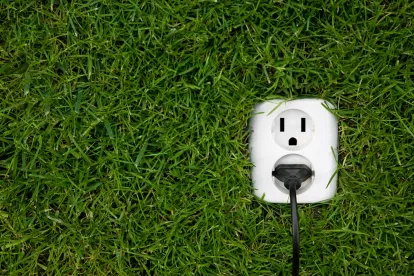Congress returns this month for the start of the 118th Congress, with Republicans in the majority in the House of Representatives and Democrats holding a slightly expanded majority in the Senate. Divided government means the final two years of President Biden’s first term in office will not see further reconciliation bills through which Democrats achieved significant climate and energy legislation in the previous Congress. With that said, there will be opportunities for bipartisan efforts on energy and sustainability — such as energy permitting reform — and the Executive Branch will continue implementation of the Bipartisan Infrastructure Law and Inflation Reduction Act (IRA).
Senators Urge Interior Department to Withdraw Energy Infrastructure Guidance
A bipartisan group of senators, led by Senate Energy & Natural Resources Committee Chairman Joe Manchin (D-WV) and including Sens. Rob Portman (R-OH), Angus King (I-ME), Bill Hagerty (R-TN), Kyrsten Sinema (I-AZ), Dan Sullivan (R-AK), Mitt Romney (R-UT), and Steve Daines (R-MT), wrote to Interior Secretary Deb Haaland on December 18. Their letter urged the Department of the Interior to withdraw draft guidance proposed by the Bureau of Ocean Energy Management (BOEM) that the senators say “puts onerous requirements on the sponsors of infrastructure projects before allowing them to take advantage of permitting benefits (such as a structured process for enhanced coordination with agencies) that are available to them under the law.” Read the letter HERE.
Inflation Reduction Act Guidebook
In December, the Biden administration released the Inflation Reduction Act guidebook. Titled Building a Clean Energy Economy: A Guidebook to the Inflation Reduction Act’s Investments in Clean Energy and Climate Action, the guidebook is intended to help state, local, territorial, and Tribal leaders, the private sector, non-profit organizations, homeowners, and communities better understand how they can benefit from IRA investments and unlock the full potential of the law. Opportunities covered in the guidebook include grants, loans, rebates, incentives, and other investments. Access the guidebook by clicking HERE.
Energy Department Proposes Standards for Energy-Efficient Distribution Transformers
On December 28, the U.S. Department of Energy (DOE) proposed new energy-efficiency standards for three categories of distribution transformers to improve the resiliency of the nation’s power grid, lower utility bills, and significantly reduce domestic carbon dioxide (CO2) emissions. According to the DOE, “the new standards would reduce U.S. CO2 emissions by 340 million metric tons over the next 30 years — an amount roughly equal to the annual emissions of 90 coal-fired power plants.” The DOE will host a public meeting on February 16, 2023, to solicit feedback on the proposed rulemaking from stakeholders. Click HERE to read more about the proposed rule and the public meeting.
Treasury Department Guidance on Labor Requirements for IRA Clean Energy Provisions
Guidance from the Treasury Department outlines prevailing wage and apprenticeship labor standards required for qualification for enhanced clean energy and climate tax provisions in the Inflation Reduction Act. Both the prevailing wage and apprenticeship requirements apply to the following tax incentives: the Advanced Energy Project Credit, the Alternative Fuel Refueling Property Credit, the Credit for Carbon Oxide Sequestration, the Clean Fuel Production Credit, the Credit for Production of Clean Hydrogen, the Energy Efficient Commercial Buildings Deduction, the Renewable Energy Production Tax Credit, and the Renewable Energy Property Investment Tax Credit. The prevailing wage requirements also apply to the New Energy Efficient Home Credit and the Zero-Emission Nuclear Power Production Credit. Read more about the guidance by clicking HERE.
Bipartisan Infrastructure Law Opportunities
Over the next several years, the Bipartisan Infrastructure Law will stand up 60 new DOE programs, including 16 demonstration and 32 deployment programs, and expand funding for 12 existing Research, Development, Demonstration, and Deployment (RDD&D) programs.
In December, DOE announced the following opportunities:
-
State-Based Home Energy Efficiency Contractor Training Grants (Request for Information) seeking public input regarding the solicitation process and structure to fund the Energy Auditor and Career Skills Training programs. Responses are due by January 26, 2023.
-
Energy Efficiency Conservation Block Grant Program (Request for Information) seeking public input regarding the solicitation process and structure of a DOE Funding Opportunity Announcement (FOA) to fund Sec. 40552, the Energy Efficiency and Conservation Block Grant (EECGB) Competitive Program, which aims to support units of local government including Indian Tribes ineligible for direct formula grants from DOE under the EECGB program to lower fossil fuel emissions and energy use in their jurisdictions, in accordance with the program’s authorizing legislation, Title V, Subtitle E of the Energy Independence and Security Act of 2007. Responses are due by January 13, 2023.
-
Advanced Clean Energy Manufacturing and Recycling Grant Program (Notice of Intent) regarding an upcoming Funding Opportunity Announcement for the program, which is designed to provide grants to small- and medium-sized manufacturers to enable them to build new or retrofit existing manufacturing and industrial facilities to produce or recycle advanced energy products in communities where coal mines or coal power plants have closed.
-
Carbon Utilization Improvement (Notice of Intent) regarding a Funding Opportunity Announcement expected to be issued in the first quarter of Fiscal Year 2023. The Carbon Utilization Program is designed to establish a grant program for state and local governments to procure and use products derived from captured carbon oxides.
-
Regional Direct Air Capture Hubs (Funding Opportunity Announcement) for eligible projects that contribute to the development and demonstration of four (4) domestic Regional DAC Hubs to accelerate the commercialization of CO2 removal via integrated capture from the atmosphere, as well as processing, transport, and secure geologic storage and/or conversion. Responses are due by March 13, 2023.




 />i
/>i

